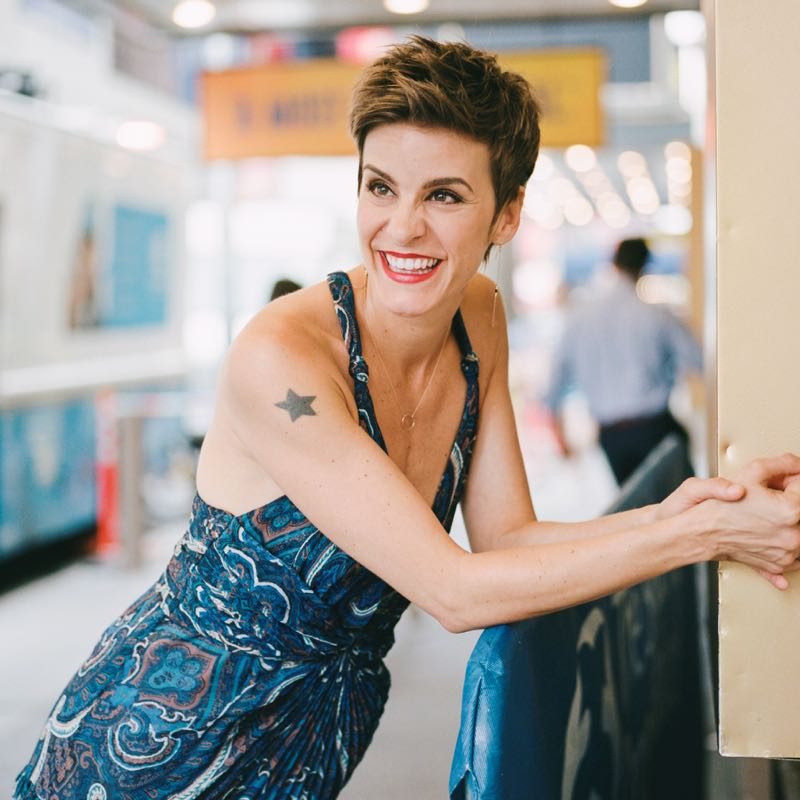An Interview with Jenn Colella
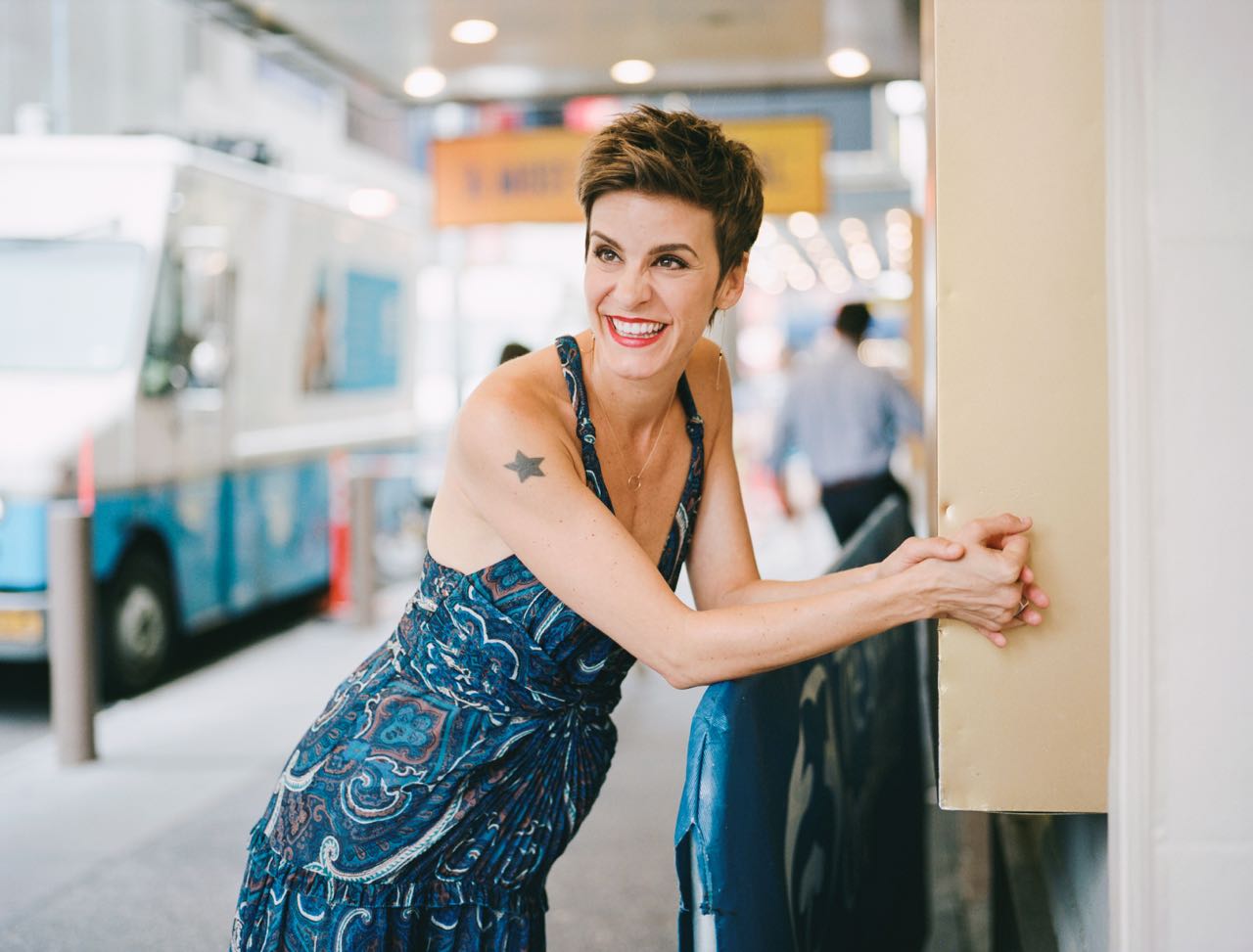
Written by Victoria Myers
Photography by Jacqueline Harriet
July 18th, 2017
In about five minutes of standing on 45th Street, three people have stopped and asked Jenn Colella to take selfies with them. She happily obliges each time before going back to having her photograph taken in front of the Schoenfeld Theatre, where the musical she’s currently appearing in, Come From Away, is playing. Come From Away is an ensemble piece that tells the story of a group of airline passengers who, on September 11th, end up stranded in a small Canadian town. With each actor playing multiple roles, one of Jenn’s main characters is Beverley Bass, the first female Captain at American Airlines. A few months ago, Jenn earned a Tony nomination for her performance, capping off years of work that had her playing a number of memorable roles in Broadway shows that didn’t last long, like Chaplin, High Fidelity, and Urban Cowboy. We sat down with Jenn to discuss how she created her characters in Come From Away, how she cultivated her attitude about the theatre business, the Tony Awards, and more.
You’ve been a part of Come From Away for a while. Lately, have you found that there’s something that’s been jumping out at you as, “Oh, that’s a really fascinating thing that I hadn’t noticed before”?
Yes. When I was preparing for the role over the course of the past two years, I was trying to be very steady in my rhythms. Not that I would say it the same every time, but we have to fit [dialogue] into a lot of smaller musical interludes. So I was trying to be respectful of my colleagues and the band and how I fit into the whole machinery of it. Now, I’m starting to relax a little bit and still fit in perfectly, but realize that I have some freedom within that tiny space to find a new way to explore a line or a moment with someone.
The song “Me and the Sky” continues to teach me. I thought it would be more and more empowering as I went on, but it’s getting a little sadder. Women come up to me and say, “This is my struggle,” and, “We have so much more to do,” and, “Our fight has only just begun,” and, “This is a reminder that women’s equality is still very much in the forefront.” Just the awareness of that, and that the audience members are bringing that to me as I sing the song. I’m finding new stuff to discover in there.
I want to go way back to when you first got the script. What was the first thing that jumped out at you as your way into this material?
I’ve played pilots before—I played Amelia Earhart in Take Flight—so immediately seeing that it was a Captain. I’m also really comfortable in a leadership role, so the leadership part, and anytime there’s a woman that needs to be a little ballsy, I feel like I automatically have an in. Mostly because I’m kind of balanced in my masculine and feminine energies. So that for me felt like, “Oh, this could be a good fit.”
You have the interesting challenge of playing multiple characters. Did you find that having to play more than one person affected how you were playing each of them?
Absolutely. We would start with the voice, and they all have different accents, which really helps. I realized that if Beverley’s a woman who’s got her shoulders thrown back, and she’s standing in a position of authority at times, then for Annette, my other main character, it was easier for me to be like, “Oh, well then her shoulders are going to round a bit, and I’m going to change my center of gravity, and she holds her hands in a completely different way.” So the more opposite I could be from one to the other would definitely help me define the characters.
It’s interesting in relation to how you calibrated the femininity of the two characters.
It’s something I’m still kind of finding. Annette is this man-hungry woman. And she’s excited that these people are in her town, and [to find out] how she can serve them. She’s having all these fantasies about all these beautiful men and different types of men that she’s seen in her town. So that’s one type of femininity, like being swirled around in the testosterone of these good-looking men. Then I find it cool, the dichotomy of Beverley who has had to rise up and break glass ceilings in a male-driven world, and hold onto her strong femininity and balance a lot of her masculine energy within that. It’s cool to still find the differences and the intricacies within both of them.
When you first start looking at a character, do you gravitate towards finding ways that they’re like you or finding ways that they’re not like you?
Like me. As I start to grow and develop it, I’ll find ways that they’re not like me, but for me, the most authentic acting is when someone brings as much of themselves as they can into each character. To completely immerse oneself into a character that doesn’t seem like you at all, that seems like a magic trick. I don’t know how someone can do that. I definitely try to find the similarities as a foundation.
Do you like to come into rehearsal with a lot of work that you’ve done at home? Or do you like to wait and discover more of it in rehearsal?
I prepare. I’m kind of like a straight-A student. I like to come in with the attitude of, “Don’t worry about me. I got it over here. Should you want to direct me, and we’ll find some stuff, good. But I’m not a concern over here.” I don’t want to be trouble for anybody. I try to come in memorized if I can. I will definitely have looked over the music. I definitely like to come in prepared. If I’m working on a new musical, then I have to be careful about committing it to such deep memory because I know that it’s constantly shifting and changing. That was a little bit of a challenge for the straight-A student in me. To be very familiar, but not too attached to any of the words or scenes because they shift it so much.
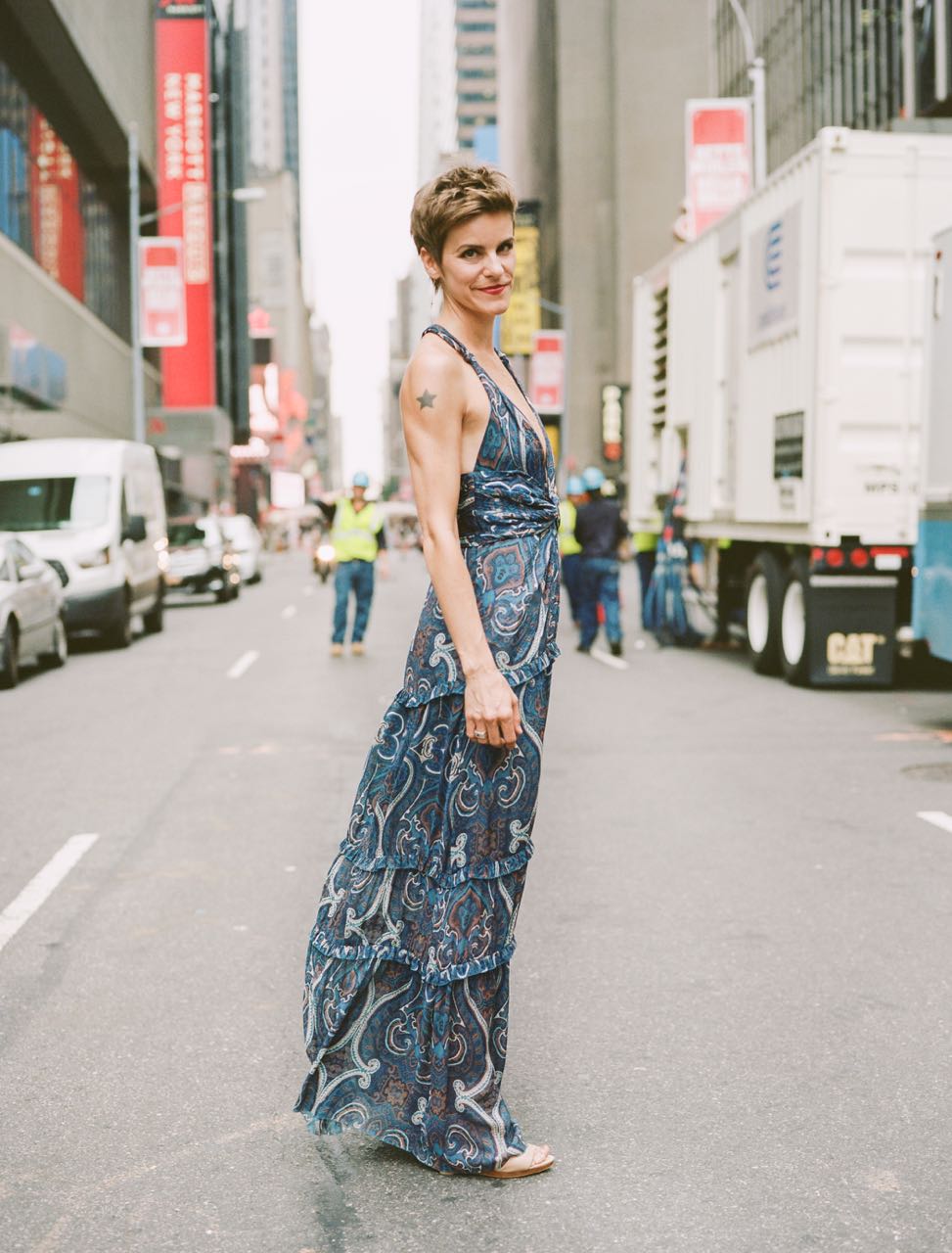
Did you do research too? There have been some articles that talked about how you and the real Beverley are friendly now.
Yeah, we’re buddies. I didn’t meet her until after we opened in La Jolla. Then once I met her, we’ve had time to have meals and drinks together. She’s been at every single opening in each city—she brought 90 female pilots to our opening in Toronto. I’ve got the best possible resource for my character. I read all the transcripts from her interviews, and then got to talk with her. It was interesting for us all getting to know Beverley, even after the show opened and had its premiere in La Jolla. New scenes have emerged, since she’s relayed even more information to us just by us being friendly and hanging out. So that’s been kind of cool to witness.
Was it an interesting challenge for you as an actress to have an actual living subject, and have that responsibility and still have the freedom to interpret and make her your own?
Yes, totally. It felt daunting at first, because my sense of responsibility to her is great, and I wanted to make sure I was honoring her. And I still do, but she’s given me the thumbs up so heartily and has been so deeply, lovingly supportive of the show and of me in particular, that while I still get nervous if she’s out there, it doesn’t feel as daunting as it once did, for sure. Chris Ashley, our director, was really helpful in that as well. He reiterated to us after we met our counterparts that we were not trying to imitate these people in any way. That they could help us and serve as guides for us, certainly, but that we’re not trying to do an exact imitation of these people. So that let me off the hook a little bit too.
What is the process like for figuring out how to navigate the fact that you’re dealing with an event that’s obviously very well known, especially in New York? Were there ever any conversations in rehearsal about how to deal with that so you’re not playing an idea or playing a certain type of ending?
The interesting thing is that it’s been different in each city that we’ve been to. The reaction in Toronto is completely different than the one in Washington D.C., which was completely different than the one in Seattle, and obviously New York has had its own beautiful reaction to it as well. We have to just play the show, the way the show is. We can’t play it any differently. Our job is to tell the story as it’s written and to trust that we’re not trying to take on all of the sorrow and the weight of what happened on that awful day. We’re actually telling this one specific story from another place during the same time. And our director, again, reminded us of that, because we were getting—and we still do get—a lot of beautiful fans and people at the stage door who want to tell us their 9/11 stories. It can get weighty, for sure. But once I remember, “This is my job. I’m telling this story. I can’t hold onto the weight of the magnitude of that day and the sadness around it,” it helps. It definitely helps.
Since you mentioned the stage door thing and people telling very personal stories, have you found that you’ve had a learning curve with that too? Of figuring out what the boundaries are in that and how to navigate them?
For sure. And I’m still figuring it out. I’m pretty good at it, but it’s tough. I also have a lot of fans who have come many times, and then those sweet folks that come and want to spend a lot of time talking to me and telling me their story, if there’s a group of 40 other people whom I still have to see, and I am also hoping to meet someone for dinner, I have to be really, really careful about it. But, yes, I think it’s a skill that I’m getting a little better at as time goes on. And people are respectful.
Have you found you’ve also had to learn how to have boundaries with doing press—and doing Tony press—and making sure you have the space you need to prepare for the show and lead your life?
For sure. During the Tonys, there wasn’t a lot of time for anything else. It was that, and that was it. And I knew that that was the case. I’d waited my whole life for those six weeks. So I wasn’t going to be like, “What about my life? What if I want to…” No. I told our press reps, “Never apologize for a bunch of press. I’m down.” I’m so, so happy to do it, and thrilled to be able to, a little bit, be the face for the show. It’s something that I believe in so deeply that it didn’t seem all that strenuous. Now after the swirl of it, I’m trying to just enjoy the fact that I have this job that I come to every night that I love, and finding the balance of my own life with some other press and stuff sprinkled in, yes, it’s a little bit of a tough balance, for sure.
When you say that you’d waited your whole life for the Tony nomination, what was the experience of that emotionally once you actually got there?
Oh, it’s beautiful. It’s amazing. I was so proud that. I’m 42, and had it happened earlier, I don’t know that I would have been able to be so present and centered. It never felt like, “Gah, what just happened?” I really, really felt centered and grateful throughout the whole thing, and thrilled to see people and not like, “Oh God, I have got to get out of here.” Never once did I feel overwhelmed in a way that felt bad. Any emotions that came up were those of pride and deep, deep gratitude. So I feel like I managed it pretty well. I think that just comes from being the age that I am and having been around for little bit.
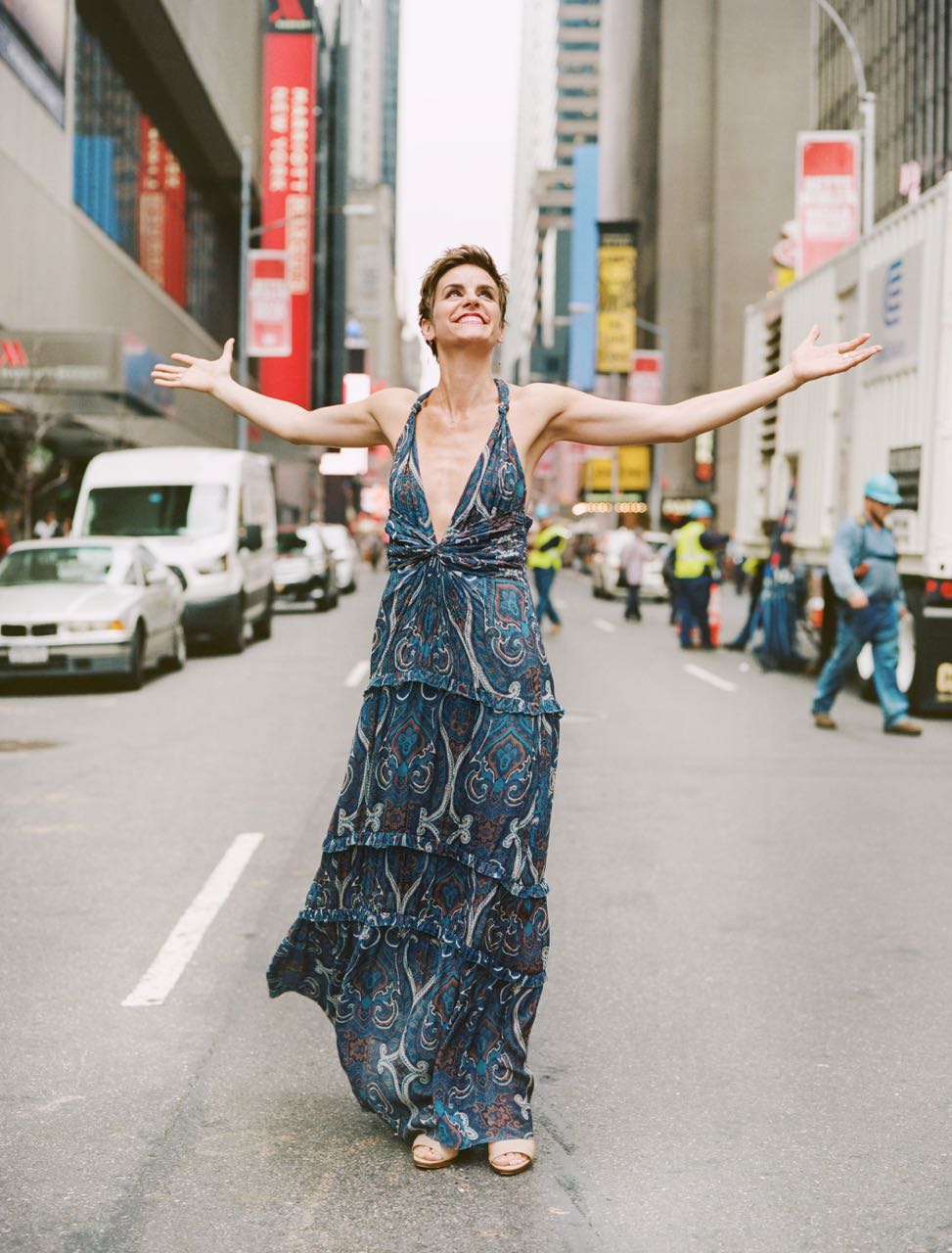
One of my favorite questions to ask actresses ever is about how, in an industry that has type-casting and is so into telling you what you’re good at and what you’re not good at, over the course of your career, how have learned to navigate that and still develop as an artistic person and creative person?
It’s so interesting. In school, they would talk about this, and warn us about finding your type and knowing what your type is. And as actors, we just want to be able to do it all. When I first got to New York, I was cast as Sissy in Urban Cowboy, so I was like, “Just because I’m from South Carolina, I don’t want to just be the Southern girl.” Then I was the rock and roll girl and the edgy girl. Then I realized, if somebody sees me as something, and I fit into that role, then I should learn to celebrate that part of me and not let it consume me. It’s up to me to take responsibility for whether or not I feel like I’m just that one thing. If people see me as a certain type, then for this particular business, that’s actually really good. That means I’m going to fit in somewhere. It’s harder when people don’t know what to do with you. So I learned to embrace that, and at the same time realized, over the course of living my life, that I’m the one who has to fulfill myself artistically and know that I can do other things and find other projects where people will take a risk and try to do other things on my own. It’s up to me to create a well-rounded person. Then people, as I grow as an artist and a person, might be able to see me as a bunch of different things. But it’s not so bad, is what I learned, to be typecast. It means you fit in somewhere, and that’s not always a terrible thing.
Do you remember a distinctive moment when you realized, “This is the attitude I should have about this”?
No. Positivity is something that I try to practice every day, so that starts to seep into my attitude for work and how I present myself and taking responsibility for my own feelings. I find that that’s really important as an actor. I teach quite a bit, and I think that helps me, because in teaching I have to say these things out loud, and I feel people responding and agreeing, so that has kind of helped me. But it’s something I’ve had to grow into for sure.
Do you have a spiritual life that affects your work?
My religion is kindness, and my practice is positivity. It starts with me, and being nice to myself. I find when I teach classes, I’m like, “We’ll get to the acting part.” Acting is easy, but how can you be somebody that producers and a director want to work with for years and years and years? How do you practice kindness out in the world, and then how’s that going to affect your energy and attitude when you walk into an audition room? And then how’s that going to affect the characters that you play? So it all kind of meshes in together. It’s something I believe in very, very much.
I always say that actors only have two things they have any control over, and the rest of it is completely out of our control. The first is how prepared we are, and the second is our attitude. And attitude isn’t something you can just put on the moment you step on stage or walk into an audition room, like, “Hello, I’m Jenn Colella.” Like who is that? I have to trust that because I’ve just held the door for someone downstairs and have been practicing kindness throughout my day before I get there, they’re going to sense that kind of energy from me when I walk into the room. People want to be around that. It’s just as important as being talented.
Do you consider yourself ambitious? What’s your relationship toward ambition?
I mean I would have to be [ambitious], right? I don’t think you can really survive for as long as I have if you’re not ambitious. But there’s a difference between ambition and hunger. I’m not hungry for fame. That’s not been my thing and never will be. I’m not hungry for awards, and while it was awesome to receive and be nominated for as many awards as I have for this particular role, it’s not about that for me. I’m ambitious because I continue to work hard, and my work ethic is strong. And I want to continue to work with the best people that I can. New York’s the best of the best. I want to work with the best for sure. But it’s not because I’m hungry for fame.
It’s interesting to think about women and ambition in relation to your character Beverley in the show, since so often women have an ambivalent relationship with ambition. Was that something you thought of in terms of the character?
I like the way Beverley describes it. She just wanted to fly, so it was just about, “How do I get myself in a plane that’s up in the air?” Then, because she was good at it and she stayed with it, [she had success]. When those of us who catch fire for something are lucky enough to feel that flame catch, if we continue to fan that flame—like me, working to be an actor from a little town in South Carolina to end up on Broadway—it’s just about fanning that flame and keeping true to the authenticity of the desire to do something you love, rather than the desire to be famous or the desire to have a lot of money or the desire to have a lot of power. It wasn’t about how she wanted to boss men around. It’s about how she wanted to fly these planes, and she became really, really good at that. And then respect came with that, because she was good at something that she loved to do.
One of the things I really loved about the Tonys this year was how all the ladies in the Supporting Actress in a Musical category had this attitude of, “We’re doing this together,” and were really supportive of each other.
We have agreed we want to meet every two to three weeks without too much time going by. We’re at that mark right now, so I call it my “Tony Crew” text thread. Then we all got these sweet shirts from fans that made these t-shirts for us that say “Stephanie. Jenn. Rachel. Kate. Mary Beth.” So we all took pictures of them. We’re going to wear them the next time we hang out. We are madly in love with each other. That has been the other biggest surprise and best gift of this particular show and the Tonys and everything, is being able to connect with these strong, incredible women whom I so deeply respect and admire.
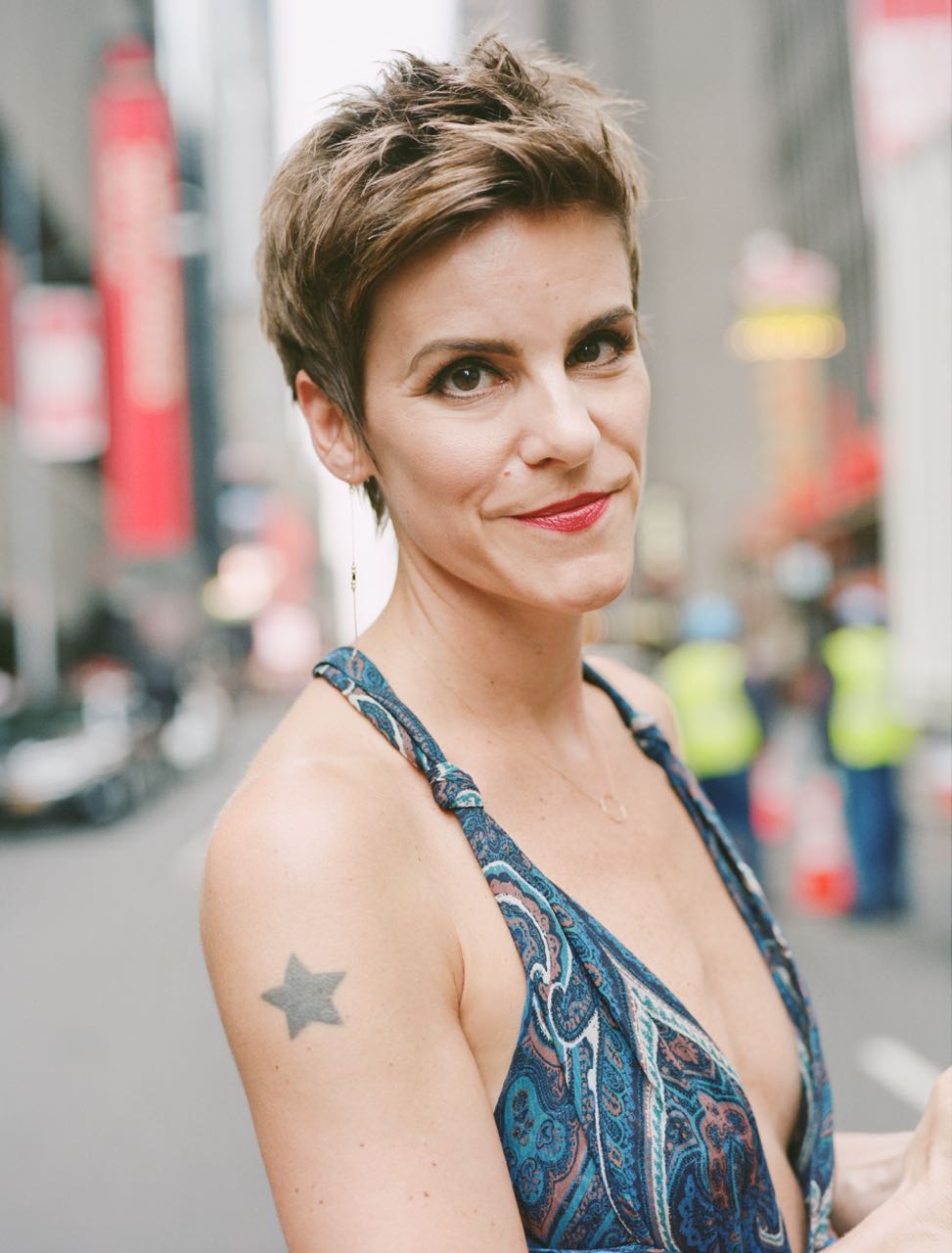
When you look around and think about parts for women in theatre, what are your thoughts? What do you think is the state of parts for women in theatre?
I think we’re doing great. I think it can be better. Obviously, there are more roles for men, more leading roles for men. There was an Equity thing that they just released about the percentage of men that were hired as opposed to women. We still have a long way to go. But if you look at the Tonys this year, there is definitely a movement happening. So it’s getting better and better. I also have found, for me, that it’s getting easier to find roles as I know who I am, and as I’m becoming a better actress. I think women get afraid that once they are a certain age that there won’t be as many roles for us. I think that’s changed as well. And I’m always a glass half-full kind of person, so for me it looks really, really good. And I think we’re on the upswing for sure. It was very apparent to me this particular Tonys, especially because I was inside of it and got to go to these luncheons and stuff and see how many strong, powerful women there were to realize that we’re definitely on an upswing. Is it predominantly men as far as producers and directors and playwrights and leads? Yes, absolutely. But that’s the case with most professions. So all we can do is continue to talk about it and shine a light on the fact that we are moving forward.
With Come From Away, is there anything that you’re like, “You know, I really wish people would talk about this aspect of it”?
There’s nothing hidden in this show. It’s a story about kindness and compassion. It’s resonating right now. I think that it’s important to not shy away from the political aspect of it, which is there’s a lot of acceptance around being mean right now on both sides. I don’t care what side you’re on, both sides are getting into the habit of saying, “You’re awful, and you’re wrong, and so I can say these horrible things and feel okay about it because most of my friends think you’re an ass.” And that has historically never worked out. Until we can find some compassion for one another and stop allowing this vitriol to be spewed so freely, we’re not going to be able to move forward. I’m hoping this show can be a reminder of that. We’re not going to be able to move forward if we don’t start looking at the other side with compassion, regardless of how different they are from us. So that’s something I really think is important to talk about.
What’s next? Do you have a dream project you want to do next?
I’m really happy to be in Come From Away, but the cool thing about New York is that there’s always something else brewing. I have a lot of scripts that have been given to me recently, and a lot of stuff that’s being developed right now that I’m interested in. I’m writing my own pilot, which I’m really, really excited about. I’ve got a couple of other things in the works.
You’re writing a pilot?
It just came about quite organically. I really can’t release anything about it yet, but I’m writing it with people who are very close to me and dear friends. It’s something that has been fun to put my creative energy into for sure.
Without saying what it’s about, what inspired you to do it?
Love. It’s a true story about love in its many forms.

